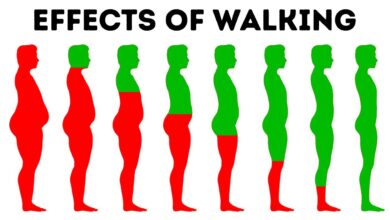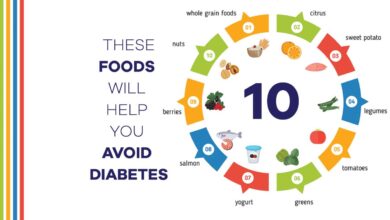
7 Ways to Stop Stress Eating and Take Control
7 Ways to Stop Stress Eating: We’ve all been there – the day is stressful, and the only thing that seems to soothe our frayed nerves is a giant plate of comfort food. But stress eating can quickly become a vicious cycle, leading to unhealthy weight gain and even more stress.
It’s time to break free from this pattern and reclaim your health and well-being. This post explores 7 practical strategies to help you stop stress eating and find healthier ways to manage your emotions.
From identifying your triggers to practicing mindfulness and incorporating physical activity, we’ll delve into actionable steps that can make a real difference. We’ll also discuss the importance of seeking professional help when needed, because you don’t have to navigate this journey alone.
Let’s embark on this path to healthier habits and a more peaceful relationship with food.
Practice Mindfulness: 7 Ways To Stop Stress Eating
Mindfulness is a powerful tool for managing stress and cravings. It involves paying attention to the present moment without judgment, which can help you become more aware of your thoughts, feelings, and bodily sensations. This awareness can help you identify triggers for stress eating and make more conscious choices about your eating habits.
One of the best ways to curb stress eating is to have healthy snacks on hand. If you’re looking for ways to boost your veggie intake, check out this article on 5 ways to up your vegetable game.
Once you’ve got your veggie game strong, you’ll have a whole arsenal of healthy, crunchy, and flavorful snacks to keep you from reaching for the chips when stress strikes.
Benefits of Mindfulness
Mindfulness has been shown to have numerous benefits for both mental and physical health. It can help reduce stress, anxiety, and depression, improve sleep quality, and boost your immune system. In the context of stress eating, mindfulness can help you:
- Become more aware of your triggers:Mindfulness can help you identify the situations, thoughts, and feelings that lead you to crave food. This awareness can empower you to develop coping mechanisms and make healthier choices.
- Reduce emotional eating:When you’re mindful, you’re more likely to notice the emotional drivers behind your eating. This can help you differentiate between physical hunger and emotional hunger and choose more mindful responses to your cravings.
- Improve your relationship with food:Mindfulness can help you cultivate a more balanced and healthy relationship with food. It can help you appreciate the experience of eating and savor the flavors of your meals.
Mindfulness Techniques
There are many different ways to practice mindfulness. Here are a few simple techniques that you can incorporate into your daily routine:
- Mindful breathing:This involves focusing on your breath as you inhale and exhale. Notice the sensation of the air moving in and out of your nostrils and the rise and fall of your chest. If your mind wanders, gently bring it back to your breath.
One of my favorite ways to combat stress eating is by replacing mindless munching with healthy, delicious meals. Asparagus is a perfect choice – it’s in season now, and it’s packed with nutrients! If you’re looking for some inspiration, check out these 12 farmers market friendly asparagus recipes.
The combination of fresh flavors and light, healthy meals can help you break the cycle of stress eating and feel better overall.
- Body scan meditation:This involves bringing your attention to different parts of your body, starting with your toes and moving up to your head. Notice any sensations, such as warmth, tingling, or tightness, without judgment.
- Mindful eating:This involves paying full attention to the experience of eating. Notice the colors, textures, and flavors of your food. Take small bites and chew slowly, savoring each mouthful. Avoid distractions like television or your phone.
Incorporating Mindfulness into Daily Routines
You can practice mindfulness in many different ways throughout your day. Here are a few examples:
- During meals:Take a few moments before each meal to practice mindful breathing. As you eat, focus on the flavors, textures, and smells of your food. Put your fork down between bites and chew slowly.
- While waiting in line:Instead of getting frustrated or bored, use this time to practice mindful breathing or observe your surroundings. Notice the colors, sounds, and smells around you.
- Before bed:Spend a few minutes practicing a body scan meditation or mindful breathing. This can help you relax and unwind before sleep.
Healthy Eating Habits

Stress eating often stems from emotional triggers, but our physical needs also play a crucial role. Nourishing your body with balanced meals and healthy snacks can help regulate your mood and energy levels, making you less susceptible to stress-induced cravings.
Design a Balanced Meal Plan, 7 ways to stop stress eating
A balanced meal plan ensures you’re getting the essential nutrients your body needs. It can help stabilize your blood sugar levels, preventing energy crashes and mood swings that might lead to stress eating.
- Include all food groups:Aim for a variety of fruits, vegetables, lean protein, whole grains, and healthy fats in each meal.
- Portion control:Pay attention to serving sizes to avoid overeating.
- Limit processed foods:These often contain high amounts of sugar, unhealthy fats, and sodium, which can contribute to cravings and stress.
Organize a List of Healthy Snacks
Having healthy snacks readily available can help prevent impulsive eating when hunger strikes.
- Fruits and vegetables:Apples, bananas, carrots, celery, and berries are nutritious and satisfying.
- Nuts and seeds:Almonds, walnuts, pumpkin seeds, and sunflower seeds provide healthy fats and protein.
- Yogurt:Greek yogurt is a good source of protein and calcium.
- Hard-boiled eggs:A great source of protein and a satisfying snack.
Prepare Meals and Snacks in Advance
Planning ahead can help you avoid reaching for unhealthy options when you’re tired or stressed.
- Cook in bulk:Prepare large batches of healthy meals and snacks to freeze for later.
- Pack lunches:Bring your own lunch to work or school to avoid the temptation of fast food or unhealthy cafeteria options.
- Keep healthy snacks on hand:Store healthy snacks in your purse, car, or desk drawer for easy access.
Engage in Physical Activity
Physical activity is a powerful tool for stress reduction, and incorporating it into your daily routine can have a significant impact on your overall well-being. When you engage in physical activity, your body releases endorphins, which have mood-boosting effects and can help alleviate stress.
Finding ways to manage stress is crucial, especially when it comes to emotional eating. From mindful meditation to exercise, there are numerous strategies to combat stress eating. One inspiring story that reminds us of the power of resilience is how Brianna went from giving up to giving it her all.
Her journey teaches us that even when facing challenges, finding the strength to persevere can lead to incredible transformations. By incorporating healthy coping mechanisms, we can all learn to navigate stress and break free from unhealthy eating habits.
Moreover, exercise helps to regulate your nervous system, promoting a sense of calm and relaxation.
Benefits of Physical Activity
Regular physical activity offers numerous benefits for both your physical and mental health. It can help improve your sleep quality, boost your energy levels, and strengthen your immune system. Exercise also plays a crucial role in managing chronic conditions such as heart disease, diabetes, and obesity.
“Physical activity is not just about losing weight or building muscle; it’s about improving your overall health and well-being.”
Moderate-Intensity Exercises
Moderate-intensity exercises are ideal for incorporating into your daily routine as they provide a good balance of physical challenge and stress reduction. Here are some examples:
- Brisk walking:Aim for at least 30 minutes of brisk walking most days of the week. This activity is accessible to most people and can be easily incorporated into your daily commute or errands.
- Cycling:Cycling is an excellent way to get some exercise while enjoying the outdoors. Aim for at least 30 minutes of cycling most days of the week.
- Swimming:Swimming is a low-impact exercise that is great for all fitness levels. Aim for at least 30 minutes of swimming most days of the week.
- Dancing:Dancing is a fun and enjoyable way to get some exercise. Aim for at least 30 minutes of dancing most days of the week.
Seek Professional Help
Stress eating can be a complex issue, and sometimes, seeking professional guidance is the best way to address it effectively. Consulting a therapist or a registered dietitian can provide valuable support and strategies to manage stress eating and achieve long-term change.
Benefits of Professional Guidance
Professional guidance can provide a structured approach to understand the underlying causes of stress eating and develop personalized strategies to address them. Therapists and dietitians can offer a safe and supportive environment to explore your emotional patterns and develop healthier coping mechanisms.
- Identifying Triggers and Underlying Issues:Professionals can help you identify the specific triggers that lead to stress eating and understand the underlying emotional or psychological factors contributing to it. For instance, a therapist might help you identify if stress eating is a coping mechanism for anxiety or depression, while a dietitian might help you recognize if certain foods are used to self-soothe or manage boredom.
- Developing Healthy Coping Mechanisms:Professionals can equip you with practical tools and strategies to manage stress and emotional distress without resorting to food. These might include relaxation techniques, mindfulness practices, journaling, or engaging in activities that bring you joy and fulfillment.
- Establishing Healthy Eating Habits:Registered dietitians can provide personalized guidance on developing balanced eating patterns that meet your nutritional needs and support your overall well-being. They can help you create a meal plan that includes nutrient-rich foods and helps you develop a healthier relationship with food.
- Addressing Underlying Mental Health Conditions:If stress eating is linked to a mental health condition such as anxiety or depression, a therapist can provide appropriate treatment and support. They might recommend therapy techniques such as cognitive-behavioral therapy (CBT) or mindfulness-based stress reduction (MBSR) to address these underlying issues.
Finding Qualified Professionals
There are various resources available to help you find qualified professionals in your area.
- National Eating Disorders Association (NEDA):NEDA provides a directory of therapists and dietitians specializing in eating disorders and related issues. They offer resources and support for individuals struggling with stress eating and related concerns.
- Academy of Nutrition and Dietetics:The Academy of Nutrition and Dietetics provides a directory of registered dietitians in your area who can offer personalized guidance on nutrition and healthy eating habits. You can search for dietitians specializing in eating disorders or stress management.
- Your Primary Care Physician:Your primary care physician can provide referrals to qualified mental health professionals or registered dietitians in your area. They can also help you navigate insurance coverage and access resources available to you.
Final Conclusion
Stopping stress eating is a journey, not a destination. There will be ups and downs, but by incorporating these strategies and being kind to yourself, you can create lasting change. Remember, it’s not about perfection, it’s about progress. Embrace the journey, celebrate your successes, and don’t hesitate to reach out for support along the way.
You deserve to live a life free from the grip of stress eating, where you can truly nourish your body and mind.






